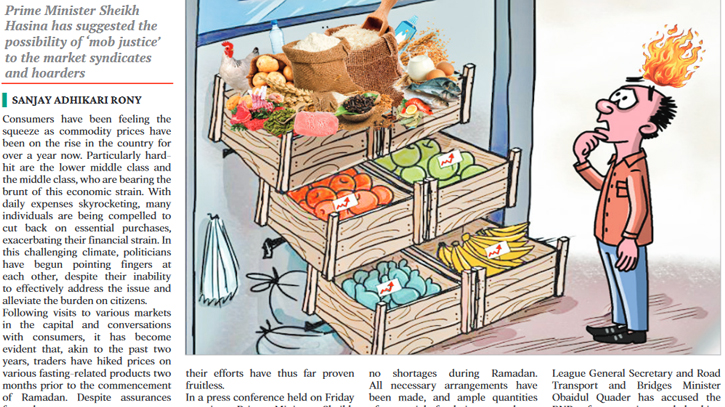
Photo : Messenger
Consumers have been feeling the squeeze as commodity prices have been on the rise in the country for over a year now. Particularly hard-hit are the lower middle class and the middle class, who are bearing the brunt of this economic strain. With daily expenses skyrocketing, many individuals are being compelled to cut back on essential purchases, exacerbating their financial strain. In this challenging climate, politicians have begun pointing fingers at each other, despite their inability to effectively address the issue and alleviate the burden on citizens.
Following visits to various markets in the capital and conversations with consumers, it has become evident that, akin to the past two years, traders have hiked prices on various fasting-related products two months prior to the commencement of Ramadan. Despite assurances from the government on numerous occasions, these measures have failed to exert any influence on the market. Businessmen remain unmoved by the government's warnings.
Consumers are expressing frustration over the incessant daily increases in the prices of certain products. Syndicated traders appear to be holding both consumers and governments hostage, with many of the major importers and hoarders of these products having connections to the government. Consequently, despite several government ministers speaking out against the syndicate, their efforts have thus far proven fruitless.
In a press conference held on Friday morning, Prime Minister Sheikh Hasina herself has voiced her strong condemnation of market syndicates and hoarders. She emphasised that those found to be concealing products and inflating prices should face severe consequences, even suggesting the possibility of "mob justice". Additionally, she raised concerns about the potential involvement of anti-government elements in the price hikes of goods across Bangladesh.
At this critical juncture, Prime Minister Sheikh Hasina reassured the public, stating, "There will be no shortages during Ramadan. All necessary arrangements have been made, and ample quantities of essential food items such as chickpeas, dates, and sugar have been procured." She highlighted the crucial role of farmers in monitoring market prices and determining when to release their products. Noting that the price control mechanism operates dynamically, she likened it to a double-edged sword, emphasising the intricate balance required to stabilise prices while ensuring fair returns for farmers.
Amidst the ongoing price hikes, leaders from the ruling Awami League and the opposition BNP have engaged in a blame game. Awami League General Secretary and Road Transport and Bridges Minister Obaidul Quader has accused the BNP of sponsoring and backing hoarders and syndicates, attributing their actions to a deliberate attempt to foment an "anarchic situation" regarding commodity prices.
In a press conference in Dhanmondi on Saturday (February 24), Obaidul Quader alleged, “BNP has fostered the syndicate and is sponsoring the hoarders. Those who are doing it are the old syndicate of BNP.”
He also said, “BNP government was a business government. Awami League did not come to do business. There is no reason to think that the government has given up on controlling commodity prices here. The vicious cycle of raising commodity prices and causing public discontent will not be spared under any circumstances.”
In a press conference convened at the BNP's central office in Nayapaltan, senior joint secretary general Ruhul Kabir Rizvi leveled serious allegations, asserting that market syndicates have gained control over the government. He claimed that the government and these profit-driven market syndicates have formed a monopolistic alliance, leading to detrimental consequences for the people of the country. Rizvi emphasised the dire impact of their nefarious influence, portraying it as a significant factor contributing to the impoverishment of the populace.
Rizvi further highlighted the widespread impact of escalating prices, noting that both low-income individuals and the middle class are facing profound helplessness. He asserted that the ruling Awami League's alleged "looter syndicate" has solidified its dominance over the market, operating with impunity under the guise of political and administrative authority. According to Rizvi, this syndicate is siphoning off enormous sums of money from the public on a daily basis, exacerbating the financial burdens of the populace. He criticised the government as ineffectual, labeling it a "dummy government" that has failed to rein in the market despite public outcry for intervention.
Rizvi continued by accusing the government of deflecting responsibility by blaming the BNP for the surge in commodity prices. He asserted that due to corruption, misrule and the alleged involvement of the Awami Syndicate in the government's affairs for 15 consecutive years without facing electoral accountability, the country is regressing to the dire circumstances reminiscent of 1974. He painted a grim picture, describing a silent famine gripping the nation, exacerbated by the government's failures and alleged malfeasance.
Earlier, on last Thursday, Ahsanul Islam Titu, State Minister for Commerce said, People have more money than they need, the products entering the market are not remaining unsold. No one is returning empty-handed. He also said, The market can never be monitored and controlled. The market has a supply chain. In this supply chain, from the producer to the consumer, everyone has to fulfill their responsibilities from their place.
When asked about this, S M Nazer Hossain, Vice President of Consumer Association of Bangladesh (CAB), told The Daily Messenger, Definitely the government has failure to control commodity prices. Because they are the ones in power now. If there are BNP traders in the syndicate, then the government can easily punish them.
He emphasised the plight of ordinary citizens grappling with the surge in commodity prices, stressing that no one should exploit this situation for political gain. With the onset of the holy month of Ramadan approaching, he urged the government to swiftly identify syndicate traders and impose stringent punitive measures against them. He underscored the urgency of decisive action to alleviate the burden on the populace and ensure a stable market environment during this critical period.
Messenger/Disha








